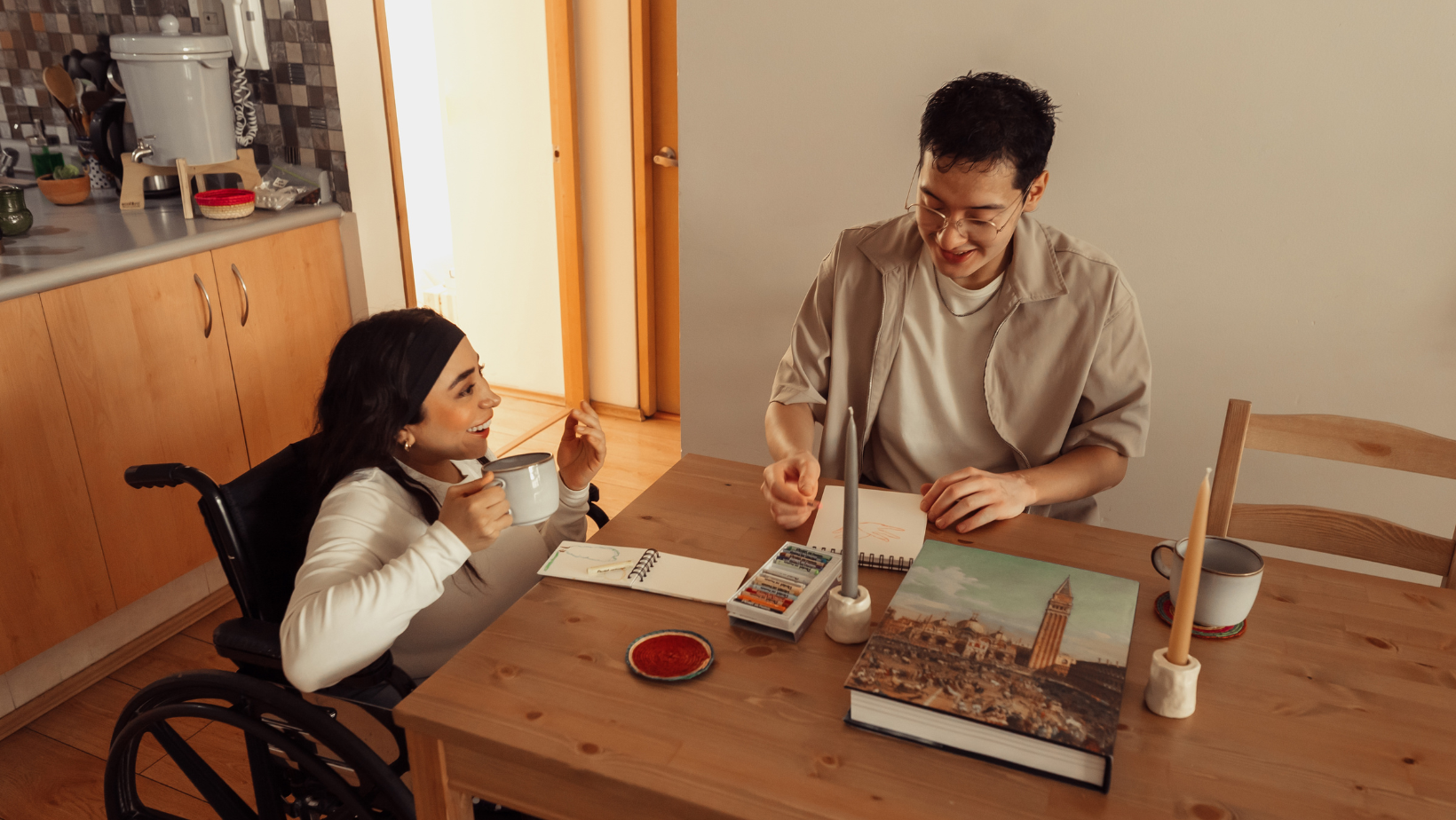Blog Layout

Why Is Person-Centered Disability Support Care Important?
North Star Oregon • June 19, 2024
Why Is Person-Centered Disability Support Care Important?
At North Star Oregon's disability support agency in Oregon, we provide person-centered care. This type of care is vital to the well-being of our program participants, but not many people are familiar with it. As you learn more about it, you’ll see why it makes sense to offer it to individuals with intellectual and developmental disabilities (I/DD).
Today, let’s explore person-centered care in detail. We’ll discuss what it is, why it’s important, and how we can implement it in our support programs and services.
Person-Centered Care Defined
So, what is person-centered care? The World Health Organization defines it as “empowering people to take charge of their own health rather than being passive recipients of services.”
In short, it’s care that focuses on an individual’s goals, values, and preferences. It empowers people with I/DD to collaborate with providers on their care plans, and it allows for effective communication between providers and program participants. It is compassionate, empathetic, and individualized. Providers give those receiving care the tools they need to meet their goals, not the goals the provider wants them to meet.
Success with person-centered care is not measured based on a provider’s findings. Rather, it’s based on outcomes that the individual receiving care reports. When success is left to program participants to determine for themselves, there’s less pressure to meet someone else’s criteria, which can motivate people to reach the goals they set.
Person-Centered Care Principles
There are four principles of person-centered care. The first one is to treat people with dignity, compassion, and respect. This may seem obvious to most people, but it’s often overlooked when working with individuals with intellectual and developmental disabilities. It’s achieved by understanding what’s essential to the individuals we’re working with, letting people make decisions about their own care, and helping them identify and achieve their own goals. Essentially, person-centered care involves treating people like capable adults and as independent people whenever possible.
The second principle is to provide coordinated care, support, and treatment. Person-centered care involves every one of a person’s care providers. Without everyone being on the same page, care can become uncoordinated, and a person’s needs might not be met. One way to coordinate care is to use the same method of communication and sharing information with each of a person’s care providers. For example, a person’s attendant care provider might be able to access information on the same platform as their day support activities (DSA) leader.
The third principle of person-centered care is to offer personalized care, support, and treatment. Each individual is different, so why would we offer everyone the same care plan? We modify our approaches for each person since a blanket approach to care and support wouldn’t be effective.
Finally, the fourth principle is enabling people to recognize and develop their strengths and abilities for an independent and fulfilling life. Those utilizing our services must be involved in the decision-making process when it comes to their care since this helps them understand themselves better. It also helps them complete tasks on their own and be less dependent on services, even though we’re always happy to provide them.
Why Person-Centered Care Is Important
Person-centered care gives each person in our care dignity. When people don’t feel in control of the services they’re receiving, they can feel devalued. We strive to prevent that by allowing individuals to play an active role in their service plan.
In addition, person-centered care helps people develop problem-solving skills. When decisions are made for people, they don’t have a chance to exercise these skills. This can cause them to feel “stuck” choosing paths that others choose for them. By letting people solve their own problems, we help them become more successful. After all, they’re the ones who determine their goals, so they’ll be more motivated to achieve them.
In addition, person-centered care helps people develop problem-solving skills. When decisions are made for people, they don’t have a chance to exercise these skills. This can cause them to feel “stuck” choosing paths that others choose for them. By letting people solve their own problems, we help them become more successful. After all, they’re the ones who determine their goals, so they’ll be more motivated to achieve them.
How to Provide Person-Centered Care
Providing person-centered care isn’t complicated. With just a few tweaks to the way service providers communicate with service users, they can implement it, too.
Having conversations instead of offering instructions or advice is one way to offer person-centered care. Both the service provider and the person with I/DD should understand each other’s goals and priorities, coming together to create a plan that works for everyone. This involves listening to understand, not simply to reply. It also requires the provider to have some negotiation skills. While a provider’s input is coming from a professional, we can’t forget the wants and needs of the individual. Collaborative approaches to providing disability support and services lead to better adherence to plans and, ultimately, better outcomes.
Another way to provide person-centered care is to equip service users with all of the relevant information they need to make informed decisions. They should be aware of how changes to policies and procedures at an organization affect them, as well as the pros and cons of choices they’re offered. Individuals may use Google to learn about their medical symptoms or disabilities. While many service providers don’t appreciate this because it gives people a false understanding of their situations, it should instead be a welcomed opportunity to educate and clarify what a person reads online. Educational approaches should be tailored to each person’s comprehension abilities.
PERSON-CENTERED CARE AS OUR COMPASS
At North Star Oregon, person-centered care and activities are our guiding principles. We believe every individual has a unique constellation of abilities, preferences, and dreams. Our commitment is to honor this individuality by tailoring our services and activities to align with each person's goals and aspirations, ensuring that their personal journey is both fulfilling and self-directed. We navigate by listening attentively to each individual, allowing their voices and choices to lead the way in the care we provide.
Disability Support Services In Salem, Oregon
North Star Oregon serves people with I/DD through
disability support services such as
Day Support Activities and
In-Home Attendant Care in the mid-Willamette Valley. We currently serve Benton, Linn, Marion, and Polk Counties. Contact us today to see if North Star Oregon can be added to your loved one’s ISP!

By North Star Oregon
•
July 22, 2024
Everyone goes through different life experiences that shape them. When those experiences are particularly distressing and they impact our worldview and reactions to situations, we refer to them as traumas. At North Star Oregon, we practice trauma informed care with the individuals we work with...
Follow Us
🦃 Happy Thanksgiving from North Star Oregon! 🍂
As we gather around the table with friends and family, we are reminded of the many blessings we have. This Thanksgiving, we are grateful for our incredible community and the opportunity to support individuals with intellectual and developmental disabilities. Your collaboration and kindness help us create a nurturing environment where everyone can thrive.
May your day be filled with warmth, love, and laughter. From our family to yours, Happy Thanksgiving! 🍁❤️
#HappyThanksgiving2024
🌟 Empowering Lives Through Compassionate IDD Support 🌟
At North Star Oregon, we’re dedicated to enhancing the lives of individuals with Intellectual and Developmental Disabilities (IDD). Our personalized services foster independence, well-being, and community involvement through day support activities, in-home attendant care, and skill-building.
Together, we’re unlocking potential, celebrating diversity, and building a brighter future. 💙
📲 Watch our reel to see how we’re making a difference, and connect with us to learn more!
Learn More: https://www.northstaroregon.com/
North Star Oregon
Philomath, OR 97370
(503) 409-5332
-
-
-
#NorthStarOregon #inhomecareoregon #inhomecareor #eugeneoregon #corvallisoregon #salemoregon #oregonbusiness #attendantcare #attendantcareoregon #autismservices #philomathoregon #disabilitysupport #developmentaldisabilities #autismsupport #disabilitycare #oregoncommunity #lanecounty #celebratingdifferences #accessibleworld #disabilityawareness #advocacy #pnwbusiness #IDD #behaviorservices #specialneedscommunity #downsyndromesupport #IDDsupport #EmpowerIDD #bentoncounty #pnwdisability
“Working with North Star has been such an enlightening experience! It’s been my first opportunity to connect with individuals with disabilities in our community and understand their unique needs. Getting hands-on with everyone, joining activities, and helping them engage with neighbors has been truly rewarding. I love seeing how our group shares friendships, celebrates birthdays, and builds connections that span across town. It's all about coming together and making a positive impact right where we live.” ⭐️
- Ashley Lewetag | Office Assistant
Interested in joining the North Star Oregon team? Learn More: https://www.northstaroregon.com/careers
North Star Oregon
Philomath, OR 97370
(503) 409-5332
-
-
-
#NorthStarOregon #inhomecareoregon #inhomecareor #eugeneoregon #corvallisoregon #salemoregon #oregonbusiness #attendantcare #attendantcareoregon #autismservices #philomathoregon #disabilitysupport #developmentaldisabilities #autismsupport #disabilitycare #oregoncommunity #lanecounty #celebratingdifferences #accessibleworld #disabilityawareness #advocacy #pnwbusiness #IDD #behaviorservices #specialneedscommunity #downsyndromesupport #IDDsupport #EmpowerIDD #bentoncounty #pnwdisability
✨ Our Mission at North Star Oregon ✨
At North Star Oregon, we are dedicated to guiding individuals with intellectual and developmental disabilities. Our mission is to create a nurturing environment where each client can thrive.
With person-centered care, we tailor our services to meet the unique needs of every individual. Our caring staff helps clients navigate their journeys toward personal growth and community connection.
We believe in the power of family involvement and foster a collaborative atmosphere that honors their essential role. Through engaging activities, we encourage clients to explore their interests, fostering joy and a sense of accomplishment.
Join us in empowering our clients to reach their fullest potential and enjoy a fulfilling life! 🌟
Learn More: https://www.northstaroregon.com/
North Star Oregon
Philomath, OR 97370
(503) 409-5332
-
-
-
#NorthStarOregon #inhomecareoregon #inhomecareor #eugeneoregon #corvallisoregon #salemoregon #oregonbusiness #attendantcare #attendantcareoregon #autismservices #philomathoregon #disabilitysupport #developmentaldisabilities #autismsupport #disabilitycare #oregoncommunity #lanecounty #celebratingdifferences #accessibleworld #disabilityawareness #advocacy #pnwbusiness #IDD #behaviorservices #specialneedscommunity #downsyndromesupport #IDDsupport #EmpowerIDD #bentoncounty #pnwdisability
Empowering Individuals with I/DD 🌟
At North Star Oregon, we provide specialized support services for individuals with Intellectual and Developmental Disabilities (I/DD). Our compassionate care promotes independence, community involvement, and personal growth, ensuring each person can thrive.
We serve all ages and offer tailored support to meet each individual's unique needs. 💙
Learn More: https://www.northstaroregon.com/
North Star Oregon
Philomath, OR 97370
(503) 409-5332
-
-
-
#NorthStarOregon #inhomecareoregon #inhomecareor #eugeneoregon #corvallisoregon #salemoregon #oregonbusiness #attendantcare #attendantcareoregon #autismservices #philomathoregon #disabilitysupport #developmentaldisabilities #disabilitycare #oregoncommunity #lanecounty #celebratingdifferences #disabilityawareness #advocacy #pnwbusiness #IDD #specialneedscommunity #downsyndromesupport #IDDsupport #EmpowerIDD #bentoncounty #pnwdisability #BrighteningPaths #EnrichingLives #MakeADifference
🎃 Happy Halloween from North Star Oregon! 🎃
Wishing everyone a spooky, fun, and safe Halloween! Whether you're dressing up, enjoying sweet treats, or spending time with loved ones, we hope your day is filled with smiles and good times. 👻✨
Remember, inclusion means making sure everyone can join the fun! Let’s celebrate in ways that make Halloween enjoyable for people of all abilities.
Stay safe and have a fang-tastic time! 🦇🕸️
Read now: New Article Post! 📖👏
What is trauma-informed care?
"Trauma-informed care acknowledges people’s entire life situations when caring for them. This includes prior distressing events, present circumstances, and triggers. It utilizes this knowledge to avoid retraumatization and provide the best care possible. We see it mentioned in healthcare settings often, but it’s also applicable to support settings for people with intellectual and developmental disabilities (I/DD)..."
Read More: https://www.northstaroregon.com/what-is-trauma-informed-care
North Star Oregon
Philomath, OR 97370
(503) 409-5332
https://www.northstaroregon.com/
-
-
-
#NorthStarOregon #inhomecareoregon #inhomecareor #eugeneoregon #corvallisoregon #salemoregon #oregonbusiness #attendantcare #attendantcareoregon #autismservices #philomathoregon #disabilitysupport #developmentaldisabilities #autismsupport #disabilitycare #oregoncommunity #lanecounty #celebratingdifferences #accessibleworld #disabilityawareness #advocacy #pnwbusiness #IDD #behaviorservices #specialneedscommunity #downsyndromesupport #IDDsupport #EmpowerIDD #bentoncounty #pnwdisability
🌟 Meet the Team at North Star Oregon 🌟
👨💼 Justin Wallace
Founder & Executive Director with 12 years of experience in the I/DD field, Justin’s leadership drives our mission for inclusive, supportive care.
👩💼 Ashley Lewetag
Our Office Assistant, Ashley, brings HR expertise and a passion for connecting with others, ensuring smooth operations.
👩💼 Lisa Farrar
As Project Coordinator, Lisa uses her background in public health to enhance training and development for our team.
Together, we’re dedicated to empowering the I/DD community! 💙
North Star Oregon
Philomath, OR 97370
(503) 409-5332
https://www.northstaroregon.com/
-
-
-
#NorthStarOregon #inhomecareoregon #inhomecareor #eugeneoregon #corvallisoregon #salemoregon #oregonbusiness #attendantcare #attendantcareoregon #autismservices #philomathoregon #disabilitysupport #developmentaldisabilities #autismsupport #disabilitycare #oregoncommunity #lanecounty #celebratingdifferences #accessibleworld #disabilityawareness #advocacy #pnwbusiness #IDD #behaviorservices #specialneedscommunity #downsyndromesupport #IDDsupport #EmpowerIDD #bentoncounty #pnwdisability
At North Star Oregon, we’re committed to fostering independence and building meaningful connections in a safe, inclusive environment. Our dedicated team offers personalized in-home attendant care and day support activities, ensuring every journey is supported with compassion and purpose. 🌟
Learn More: https://www.northstaroregon.com/
North Star Oregon
Philomath, OR 97370
(503) 409-5332
-
-
-
#NorthStarOregon #inhomecareoregon #inhomecareor
#eugeneoregon #corvallisoregon #salemoregon #oregonbusiness #attendantcare #attendantcareoregon #autismservices #philomathoregon #disabilitysupport #developmentaldisabilities #autismsupport #disabilitycare #oregoncommunity #lanecounty #celebratingdifferences #accessibleworld #disabilityawareness #advocacy #pnwbusiness #IDD #IDDsupport #EmpowerIDD #bentoncounty #pnwdisability #BrighteningPaths #EnrichingLives #MakeADifference
At North Star Oregon, we believe in providing compassionate, high-quality care in the comfort of your home. Our In-Home Attendant Care services are designed to support individuals with intellectual and developmental disabilities (I/DD) and meet their unique health and daily living needs. 🏡
Our experienced professionals work closely with healthcare providers to ensure that medical routines are managed with precision and empathy. Beyond health management, we offer support with daily activities such as:
✨ Personal Hygiene
✨ Meal Preparation
✨ Mobility Assistance
✨ Companionship & Emotional Support
✨ & MORE!
Whether it’s a friendly chat, household help, or engaging in hobbies, we tailor our care to every individual, ensuring they stay connected to what matters most. 💙
We proudly serve people of all ages—children, adults, and seniors—throughout Benton, Linn, Marion, Polk, and surrounding counties.
At North Star, we are dedicated to enhancing independence and quality of life while fostering dignity and respect for all. 🌟
📞 Contact us today to learn how we can support you or your loved one!
Learn More: https://www.northstaroregon.com/
North Star Oregon
Philomath, OR 97370
(503) 409-5332
-
-
-
#NorthStarOregon #inhomecareoregon #inhomecareor #eugeneoregon #corvallisoregon #salemoregon #oregonbusiness #attendantcare #attendantcareoregon #autismservices #philomathoregon #disabilitysupport #developmentaldisabilities #autismsupport #disabilitycare #oregoncommunity #lanecounty #celebratingdifferences #accessibleworld #disabilityawareness #advocacy #pnwbusiness #IDD #behaviorservices #specialneedscommunity #downsyndromesupport #IDDsupport #EmpowerIDD #bentoncounty #pnwdisability
🌟 Welcome to North Star Oregon! 🌟
Our journey began with a simple yet powerful vision: to make a meaningful difference in the lives of individuals with developmental disabilities. Right here in the heart of the county, we’ve been bringing personalized care and supportive services to individuals and families, and we continue to grow, guided by our core values.
At North Star Oregon, we believe that every individual deserves the opportunity to thrive. That’s why we provide personalized in home attendant care services and engaging day support activities tailored to meet the unique needs and aspirations of each person we serve.
Our dedicated team is committed to fostering independence, building meaningful connections, and creating a safe and inclusive environment where everyone feels valued and supported.
Together, we’re brightening paths and enriching lives. Join us on this journey to make a difference!
Videography by @KWProductions
North Star Oregon
Philomath, OR 97370
(503) 409-5332
https://www.northstaroregon.com/
-
-
-
#NorthStarOregon #inhomecareoregon #inhomecareor #eugeneoregon #corvallisoregon #salemoregon #oregonbusiness #attendantcare #attendantcareoregon #autismservices #philomathoregon #disabilitysupport #developmentaldisabilities #autismsupport #disabilitycare #oregoncommunity #lanecounty #celebratingdifferences #accessibleworld #disabilityawareness #advocacy #pnwbusiness #IDD #IDDsupport #EmpowerIDD #bentoncounty #pnwdisability #BrighteningPaths #EnrichingLives #MakeADifference
Read now: New Article Post! 📖👏
How to be inclusive of people with intellectual and developmental disabilities:
"Some people with disabilities prefer person-first language, which recognizes people for who they are instead of what they have. Instead of calling someone autistic, for example, we may refer to them as a “person with autism.” On the other hand, others prefer identity-first language—in this case, you would refer to them as autistic. Some communities generally prefer one over the other, but it’s still best to check with a person with disabilities to see how they’d like us to describe them.
We should also be aware of derogatory language, which needs to be avoided entirely. If you’re not sure if a certain word is acceptable, just ask!"
Read More: https://www.northstaroregon.com/how-to-be-inclusive-of-people-with-intellectual-and-developmental-disabilities
North Star Oregon
Philomath, OR 97370
(503) 409-5332
https://www.northstaroregon.com/
-
-
-
#NorthStarOregon #inhomecareoregon #inhomecareor #eugeneoregon #corvallisoregon #salemoregon #oregonbusiness #attendantcare #attendantcareoregon #autismservices #philomathoregon #disabilitysupport #developmentaldisabilities #autismsupport #disabilitycare #oregoncommunity #lanecounty #celebratingdifferences #accessibleworld #disabilityawareness #advocacy #pnwbusiness #IDD #IDDsupport #EmpowerIDD #bentoncounty #pnwdisability #BrighteningPaths #EnrichingLives #MakeADifference
Back to School: Embracing new opportunities together! 📚
As the school year begins, we’re excited to support students with intellectual and developmental disabilities as they embark on new learning journeys. At North Star Oregon, we’re committed to helping to provide the tools, resources, and encouragement needed to ensure a successful and enriching school year for each I/DD student.
Wishing everyone a fantastic start to the school year!
North Star Oregon
Philomath, OR 97370
(503) 409-5332
https://www.northstaroregon.com/
-
-
-
#NorthStarOregon #inhomecareoregon #inhomecareor #eugeneoregon #corvallisoregon #salemoregon #oregonbusiness #attendantcare #attendantcareoregon #autismservices #philomathoregon #disabilitysupport #developmentaldisabilities#autismsupport #disabilitycare #oregoncommunity #lanecounty #celebratingdifferences #accessibleworld #disabilityawareness #advocacy #pnwbusiness #IDD #IDDsupport #EmpowerI #bentoncounty #pnwdisability #BrighteningPaths #EnrichingLives #MakeADifference
At North Star Oregon, we’re committed to fostering independence and building meaningful connections in a safe, inclusive environment. Our dedicated team offers personalized in-home attendant care and day support activities, ensuring every journey is supported with compassion and purpose. 🌟
Learn More: https://www.northstaroregon.com/
Videography by @kw_productions
North Star Oregon
Philomath, OR 97370
(503) 409-5332
-
-
-
#NorthStarOregon #inhomecareoregon #inhomecareor #eugeneoregon #corvallisoregon #salemoregon #oregonbusiness #attendantcare #attendantcareoregon #autismservices #philomathoregon #disabilitysupport #developmentaldisabilities #autismsupport #disabilitycare #oregoncommunity #lanecounty #celebratingdifferences #accessibleworld #disabilityawareness #advocacy #pnwbusiness #IDD #IDDsupport #EmpowerIDD #bentoncounty #pnwdisability #BrighteningPaths #EnrichingLives #MakeADifference we
🎉 Happy Labor Day! 🎉
Today, we celebrate the hard work and dedication of all those who contribute to our success. Whether relaxing with your family, enjoying a well-deserved break, or taking on new challenges, we hope you have a fantastic day!
Thank you for all that you do. Here's to a beautiful Labor Day filled with joy and relaxation!
#LaborDay2024
Read now: New Article Post! 📖👏
What is person-centered language?
"Also called person-centered language, person-centered language refers to individuals as people before discussing their disabilities. In short, it describes what someone “has” instead of what someone “is.” When we use person-centered language, we avoid using adjectives to describe people and instead describe what a person is experiencing. "
Read More: https://www.northstaroregon.com/what-is-person-centered-language
North Star Oregon
Philomath, OR 97370
(503) 409-5332
https://www.northstaroregon.com/
-
-
-
#NorthStarOregon #inhomecareoregon #inhomecareor #eugeneoregon #corvallisoregon #salemoregon #oregonbusiness #attendantcare #attendantcareoregon #autismservices #philomathoregon #disabilitysupport #developmentaldisabilities #autismsupport #disabilitycare #oregoncommunity #lanecounty #celebratingdifferences #accessibleworld
#disabilityawareness #advocacy #pnwbusiness #IDD #IDDsupport #EmpowerIDD
#bentoncounty #pnwdisability #BrighteningPaths #EnrichingLives #MakeADifference
Justin Wallace, Executive Director & Founder of North Star Oregon, shares about how North Star Oregon came to be!
Learn More: https://www.northstaroregon.com/about
Videography by @kw_productions
North Star Oregon
Philomath, OR 97370
(503) 409-5332
-
-
-
#NorthStarOregon #inhomecareoregon #inhomecareor #eugeneoregon #corvallisoregon #salemoregon #oregonbusiness #attendantcare #attendantcareoregon #autismservices #philomathoregon #disabilitysupport #developmentaldisabilities #autismsupport #disabilitycare #oregoncommunity #lanecounty #celebratingdifferences #accessibleworld #disabilityawareness #advocacy #pnwbusiness #IDD #IDDsupport #EmpowerIDD #bentoncounty #pnwdisability #BrighteningPaths #EnrichingLives #MakeADifference
At North Star Oregon, we enrich the lives of intellectually and developmentally disabled individuals through supportive day activities, in-home care, and attendant services.
We thrive on community involvement and offer various partnership opportunities for local businesses, organizations, and individuals.
If you're interested in partnering with us or know of beneficial opportunities, please reach out via our website. Let's illuminate the path to empowerment and success.
Learn More: https://www.northstaroregon.com/careers
North Star Oregon
Philomath, OR 97370
(503) 409-5332
-
-
-
#NorthStarOregon #inhomecareoregon #inhomecareor #eugeneoregon #corvallisoregon #salemoregon #oregonbusiness #attendantcare #attendantcareoregon #autismservices #philomathoregon #disabilitysupport #developmentaldisabilities #autismsupport #disabilitycare #oregoncommunity #lanecounty #celebratingdifferences #accessibleworld
#disabilityawareness #advocacy #pnwbusiness #IDD #IDDsupport #EmpowerIDD
#bentoncounty #pnwdisability #BrighteningPaths #EnrichingLives #MakeADifference
Mindset is everything. 💡✨
If you believe it will work, you'll see opportunities. If you believe it won't, you'll see obstacles. Shift your perspective and open doors to endless possibilities! 🌟🚀
Learn More: https://www.northstaroregon.com/
North Star Oregon
Philomath, OR 97370
(503) 409-5332
-
-
-
#NorthStarOregon #inhomecareoregon #inhomecareor #eugeneoregon #corvallisoregon #salemoregon #oregonbusiness #attendantcare #attendantcareoregon #autismservices #philomathoregon #disabilitysupport #developmentaldisabilities #autismsupport #disabilitycare #oregoncommunity #lanecounty #celebratingdifferences #accessibleworld #disabilityawareness #advocacy #pnwbusiness #IDD #IDDsupport #EmpowerIDD #bentoncounty #pnwdisability #BrighteningPaths #EnrichingLives #MakeADifference
🌟 North Star expands to Polk County! 🌟
North Star is proud to extend our services to Salem, Monmouth, Independence, and beyond. We believe in the uniqueness of every individual, offering personalized in-home care and engaging day support activities to meet diverse needs and aspirations. Your journey is special, and we’re here to illuminate every step. ✨
If you or someone you know is looking for a company like ours in Polk County - contact us today!
Videography by @kw_productions
North Star Oregon
Philomath, OR 97370
(503) 409-5332
-
-
-
#NorthStarOregon #inhomecareoregon #inhomecareor #eugeneoregon #corvallisoregon #salemoregon #oregonbusiness #attendantcare #attendantcareoregon #autismservices #philomathoregon #disabilitysupport #developmentaldisabilities #autismsupport #disabilitycare #oregoncommunity #lanecounty #celebratingdifferences #accessibleworld #disabilityawareness #advocacy #pnwbusiness #IDD #IDDsupport #EmpowerIDD #bentoncounty #pnwdisability #BrighteningPaths #EnrichingLives #MakeADifference
Read now: New Article Post! 📖👏
Myths and facts about people with intellectual and developmental disabilities:
"Being around people with disabilities can increase compassion for others. We live in a world that simply doesn’t make time for people who process things more slowly, and introducing neurotypical people to those with I/DD can help them become more patient. It also helps neurotypical people see things from the perspective of those who aren’t exactly like them. This can help them become better friends and even better leaders. "
Read More: https://www.northstaroregon.com/myths-and-facts-about-people-with-intellectual-and-developmental-disabilities
North Star Oregon
Philomath, OR 97370
(503) 409-5332
https://www.northstaroregon.com/
-
-
-
#NorthStarOregon #inhomecareoregon #inhomecareor #eugeneoregon #corvallisoregon #salemoregon #oregonbusiness #attendantcare #attendantcareoregon #autismservices #philomathoregon #disabilitysupport #developmentaldisabilities #autismsupport #disabilitycare #oregoncommunity #lanecounty #celebratingdifferences #accessibleworld #disabilityawareness #advocacy #pnwbusiness #IDD #IDDsupport #EmpowerIDD #bentoncounty #pnwdisability #BrighteningPaths #EnrichingLives #MakeADifference
🌟 At North Star, every individual deserves the opportunity to shine! 🌟
We provide personalized attendant care and engaging day support activities tailored to meet the diverse needs and aspirations of each person we serve. Our mission is to fill a vital gap in the community, helping people get out, connect, and truly engage with their local communities.
“I’ve been with North Star for two years now. It’s a lot of fun, making new friends and doing things I never thought I could do!”
Watch the full video here: https://youtu.be/5V9G0JKR8pA
Videography by @kw_productions
Learn More: https://www.northstaroregon.com/
North Star Oregon
Philomath, OR 97370
(503) 409-5332
-
-
-
#NorthStarOregon #inhomecareoregon #inhomecareor #eugeneoregon #corvallisoregon #salemoregon #oregonbusiness #attendantcare #attendantcareoregon #autismservices #philomathoregon #disabilitysupport #developmentaldisabilities #autismsupport #disabilitycare #oregoncommunity #lanecounty #celebratingdifferences #accessibleworld #disabilityawareness #advocacy #pnwbusiness #IDD #IDDsupport #EmpowerIDD #bentoncounty #pnwdisability #BrighteningPaths #EnrichingLives #MakeADifference
Read now: New Article Post! 📖👏
Why is person-centered disability support care important?
"Success with person-centered care is not measured based on a provider’s findings. Rather, it’s based on outcomes that the individual receiving care reports. When success is left to program participants to determine for themselves, there’s less pressure to meet someone else’s criteria, which can motivate people to reach the goals they set."
Read More: https://www.northstaroregon.com/why-is-person-centered-disability-support-care-important
North Star Oregon
Philomath, OR 97370
(503) 409-5332
https://www.northstaroregon.com/
-
-
-
#NorthStarOregon #inhomecareoregon #inhomecareor #eugeneoregon #corvallisoregon #salemoregon #oregonbusiness #attendantcare #attendantcareoregon #autismservices #philomathoregon #disabilitysupport #developmentaldisabilities #autismsupport #disabilitycare #oregoncommunity #lanecounty #celebratingdifferences #accessibleworld #disabilityawareness #advocacy #pnwbusiness #IDD #IDDsupport #EmpowerIDD #bentoncounty #pnwdisability #BrighteningPaths #EnrichingLives #MakeADifference
The rewarding experience of working at North Star Oregon:
“What I found rewarding about my work at North Star is getting involved in this industry. I already had some experience supporting people in the community, taking them out, having fun, and doing activities with them. Integrating them into the community in a way that mirrors their foster home or family life is incredibly fulfilling.
Every Monday through Friday, we have the privilege of helping our clients explore new experiences. Hearing them say, ‘I like this,’ I want to try more of this,’ or ‘I’ve never been here before’ makes it all worthwhile. At the end of the day, the satisfaction of knowing I’ve lightened the load for a family and provided joy to someone is immensely rewarding.
I look forward to this every day, knowing that my work makes a tangible difference in the lives of others.”
Apply now to be a part of the North Star team: https://www.northstaroregon.com/careers
Videography by @kw_productions
North Star Oregon
Philomath, OR 97370
(503) 409-5332
-
-
-
#NorthStarOregon #inhomecareoregon #inhomecareor #eugeneoregon #corvallisoregon #salemoregon #oregonbusiness #attendantcare #attendantcareoregon #autismservices #philomathoregon #disabilitysupport #developmentaldisabilities #autismsupport #disabilitycare #oregoncommunity #lanecounty #celebratingdifferences #accessibleworld #disabilityawareness #advocacy #pnwbusiness #IDD #IDDsupport #EmpowerIDD #bentoncounty #pnwdisability #BrighteningPaths #EnrichingLives #MakeADifference
🇺🇸🎆 Happy 4th of July! 🎆🇺🇸
Today, we celebrate the land of the free and the home of the brave. Let's honor the spirit of independence, unity, and freedom that defines our great nation. Enjoy the fireworks, BBQs, parades, and time with loved ones. Here's to liberty and justice for all!
Wishing everyone a safe and joyous Independence Day! 🗽❤️🤍💙
Learn More: https://www.northstaroregon.com/
North Star Oregon
Philomath, OR 97370
(503) 409-5332
https://www.northstaroregon.com/
-
-
-
#NorthStarOregon #4thofJuly #IndependenceDay
It’s truly beyond words to express the privilege we have in serving individuals with intellectual and developmental disabilities. Every day, we witness extraordinary stories of resilience, joy, and triumph that fill our hearts. To contribute to the lives of these incredible people is not just our job—it’s our passion and an honor. Our journey together is filled with learning, growth, and most importantly, love. Here’s to celebrating every small victory and embracing the unique journey of every individual we are fortunate enough to support.
Sophie’s story is just one of many that we have been honored to contribute to.
Thank you for sharing your experience. ❤️
Videography by @kw_productions
Learn More: https://www.northstaroregon.com/
North Star Oregon
Philomath, OR 97370
(503) 409-5332
-
-
-
#NorthStarOregon #inhomecareoregon #inhomecareor #eugeneoregon #corvallisoregon #salemoregon #oregonbusiness #attendantcare #attendantcareoregon #autismservices #philomathoregon #disabilitysupport
#developmentaldisabilities #advocacy #pnwbusiness
#IDD #IDDsupport #EmpowerIDD #bentoncounty #pnwdisability #BrighteningPaths #EnrichingLives #MakeADifference #ThankYou #Grateful #Testimonial #CommunitySupport #HelpingOthers #Appreciation #YourStoryMatters
At North Star Oregon, we hold ourselves to the highest standards, striving for excellence in everything we do. From our meticulous attention to detail to our unwavering dedication to quality, we are committed to delivering outstanding results every time. 🌲🌲🌲
Learn More: https://www.northstaroregon.com/
North Star Oregon
Philomath, OR 97370
(503) 409-5332
-
-
-
#NorthStarOregon #inhomecareoregon #inhomecareor #eugeneoregon #corvallisoregon #salemoregon #oregonbusiness #attendantcare #attendantcareoregon #autismservices #philomathoregon #disabilitysupport #developmentaldisabilities #autismsupport #disabilitycare #oregoncommunity #lanecounty #celebratingdifferences #accessibleworld #disabilityawareness #advocacy #pnwbusiness #IDD #behaviorservices #specialneedscommunity #bentoncounty #pnwdisability #TraumaInformedCare #Empowerment #HealingJourney
🌟 Illuminating Individual Growth with Every Step 🌟
At North Star Oregon, we believe that personal growth is a journey illuminated by dedication, passion, and the pursuit of excellence. Each step we take, whether big or small, brings us closer to our fullest potential. 🌱✨
Join us as we continue to illuminate the path of growth, inspiring and empowering one another to achieve greatness with every step. Let’s walk this journey together and shine brighter than ever! 🌟🚀
Learn More: https://www.northstaroregon.com/
North Star Oregon
Philomath, OR 97370
(503) 409-5332
-
-
-
#NorthStarOregon #inhomecareoregon #inhomecareor
#eugeneoregon #corvallisoregon #salemoregon #oregonbusiness #attendantcare #attendantcareoregon #autismservices #philomathoregon #disabilitysupport
#developmentaldisabilities #autismsupport #disabilitycare #oregoncommunity #lanecounty #celebratingdifferences #accessibleworld #disabilityawareness #advocacy #pnwbusiness #IDD #IDDsupport #EmpowerIDD #bentoncounty #pnwdisability #BrighteningPaths #EnrichingLives #MakeADifference
We are thrilled to share the collaboration between North Star and the Corvallis Daytime Drop-in Center! 🤝✨
Together, we are dedicated to making a positive impact in our community by providing essential services and support to individuals with intellectual and developmental disabilities (I/DD). This partnership will enable us to expand our reach and enhance the resources available to help individuals thrive.
The Corvallis Daytime Drop-in Center (CDDC) is a community-based resource hub providing information, referrals, and direct services for people experiencing homelessness and poverty in Benton County and beyond. 🌟
Follow the Corvallis Daytime Drop-In Center @corvallisddc
Videography by @kw_productions
Learn More: https://www.northstaroregon.com/
North Star Oregon
Philomath, OR 97370
(503) 409-5332
-
-
-
#NorthStarOregon #inhomecareoregon #inhomecareor
#eugeneoregon #corvallisoregon #salemoregon #oregonbusiness #attendantcare #attendantcareoregon #autismservices #philomathoregon #disabilitysupport
#developmentaldisabilities #advocacy #pnwbusiness #IDD #IDDsupport #EmpowerIDD #bentoncounty #pnwdisability #BrighteningPaths #EnrichingLives #MakeADifference #ThankYou #Grateful #Testimonial #CommunitySupport #HelpingOthers #Appreciation #YourStoryMatters
🧭 At North Star Oregon, We are steadfast in creating an inclusive environment that acknowledges and celebrates the diversity of our clients, fostering a sense of belonging and acceptance for all. ⭐️
Learn More: https://www.northstaroregon.com/
North Star Oregon
Philomath, OR 97370
(503) 409-5332
-
-
-
#NorthStarOregon #inhomecareoregon #inhomecareor #eugeneoregon #corvallisoregon #salemoregon #oregonbusiness #attendantcare #attendantcareoregon #autismservices #philomathoregon #disabilitysupport #developmentaldisabilities #autismsupport #disabilitycare #oregoncommunity #lanecounty #celebratingdifferences #accessibleworld #disabilityawareness #advocacy #pnwbusiness #IDD #IDDsupport #EmpowerIDD #bentoncounty #pnwdisability #BrighteningPaths #EnrichingLives #MakeADifference
The ❤️of everything we do.
At North Star Oregon, compassion isn't just a word – it's the guiding principle that shapes every interaction and service we provide. We believe that true empathy and understanding are the cornerstones of building meaningful connections and making a positive impact in the lives of our clients.
We take the time to listen, to understand your needs and concerns truly, and to offer support and guidance every step of the way. 💙🌿
Learn More: https://www.northstaroregon.com/
North Star Oregon
Philomath, OR 97370
(503) 409-5332
-
-
-
#NorthStarOregon
#inhomecareoregon #inhomecareor
#eugeneoregon #corvallisoregon #salemoregon #oregonbusiness #attendantcare #attendantcareoregon #autismservices #philomathoregon #disabilitysupport
#developmentaldisabilities
#autismsupport #disabilitycare
#oregoncommunity
#lanecounty #celebratingdifferences
#accessibleworld
#disabilityawareness
#advocacy #pnwbusiness
#IDD #behaviorservices
#specialneedscommunity
#bentoncounty #pnwdisability
#TraumaInformedCare #Empowerment #HealingJourney
🌟 Embrace the Journey of Learning and Living 📚💫
"Learn as if you will live forever, live like you will die tomorrow." —Mahatma Gandhi 🌿 These timeless words remind us to cherish every moment, seize every opportunity, and never stop seeking knowledge and growth.
Empowering Journeys, Celebrating Potential – Join North Star Oregon.
Learn More: https://www.northstaroregon.com/
North Star Oregon
Philomath, OR 97370
(503) 409-5332
-
-
-
#NorthStarOregon #inhomecareoregon #inhomecareor #eugeneoregon #corvallisoregon #salemoregon #oregonbusiness #attendantcare #attendantcareoregon #autismservices #philomathoregon #disabilitysupport #developmentaldisabilities #autismsupport #disabilitycare #oregoncommunity #lanecounty #celebratingdifferences #accessibleworld #disabilityawareness #advocacy #pnwbusiness #IDD #behaviorservices #specialneedscommunity #downsyndromesupport #IDDsupport #EmpowerIDD #bentoncounty #pnwdisability
At North Star Oregon, our day support activities are thoughtfully designed to provide our clients with enriching experiences that foster personal growth, skill development, and community integration.
We believe in the power of engaging in a wide range of activities that not only bring joy but also enhance physical and emotional well-being.
From the thrill of striking pins at the local bowling alley to the serene walks through the verdant landscapes of the Pacific Northwest, our clients revel in activities that stimulate both body and mind.
Our outings to the local art studio in Corvallis, Oregon, offer a canvas for creativity where clients can express themselves through painting, crafting, and various arts. These activities are tailored to encourage self-expression and build confidence in a supportive group setting.
Learn More: https://www.northstaroregon.com/
North Star Oregon
Philomath, OR 97370
(503) 409-5332
-
-
-
#NorthStarOregon #inhomecareoregon #inhomecareor #eugeneoregon #corvallisoregon #salemoregon #oregonbusiness #attendantcare #attendantcareoregon #autismservices #philomathoregon #disabilitysupport #developmentaldisabilities #autismsupport #disabilitycare #oregoncommunity #lanecounty #celebratingdifferences #accessibleworld
#disabilityawareness #advocacy #pnwbusiness #IDD #behaviorservices #specialneedscommunity #downsyndromesupport #IDDsupport #EmpowerIDD #bentoncounty #pnwdisability
🌟✨ Brightening Paths, Enriching Lives ✨🌟
At North Star Oregon, we're more than just a service provider – we're your partners in personal growth and empowerment. With our unwavering commitment to brightening paths and enriching lives, we're here to illuminate the way forward and make a positive impact every step of the journey.
Together, let's create a world where every path is illuminated with hope, opportunity, and possibility. Together, let's brighten paths and enrich lives. 💫🌈
Learn More: https://www.northstaroregon.com/
North Star Oregon
Philomath, OR 97370
(503) 409-5332
-
-
-
#NorthStarOregon #inhomecareoregon #inhomecareor #eugeneoregon #corvallisoregon #salemoregon #oregonbusiness #attendantcare #attendantcareoregon #philomathoregon #disabilitysupport #developmentaldisabilities #autismsupport #disabilitycare #oregoncommunity #lanecounty #celebratingdifferences #accessibleworld
#disabilityawareness #advocacy #pnwbusiness #IDD #behaviorservices #specialneedscommunity #downsyndromesupport #IDDsupport #EmpowerIDD #BrighteningPaths #EnrichingLives #MakeADifference
Serving Our Community with Compassion 🌟
At North Star, we believe in the power of inclusivity and the strength of diversity. Every member of our community deserves to feel valued, respected, and empowered, regardless of their abilities.
As a proud advocate for individuals with disabilities, we are dedicated to providing support, resources, and services that enhance their quality of life and promote their independence. From tailored programs and personalized care to accessible facilities and inclusive events, we strive to create a welcoming environment where everyone feels seen, heard and included.
Learn More: https://www.northstaroregon.com/
North Star Oregon
Philomath, OR 97370
(503) 409-5332
-
-
-
#NorthStarOregon #inhomecareoregon #inhomecareor #eugeneoregon #corvallisoregon #salemoregon #oregonbusiness #attendantcare #attendantcareoregon #autismservices #philomathoregon #disabilitysupport #developmentaldisabilities #autismsupport #disabilitycare #oregoncommunity #lanecounty #celebratingdifferences #accessibleworld #disabilityawareness #advocacy #pnwbusiness #IDD #behaviorservices #specialneedscommunity #downsyndromesupport #IDDsupport #EmpowerIDD #bentoncounty #pnwdisability
Start by doing what's necessary, then watch the miracles unfold! ✨🌟
These words hold the power to ignite the flames of possibility within us all. Often, the journey to achieving our dreams may seem daunting, even impossible. Yet, when we break it down into manageable steps, focusing on what's necessary and within our reach, the impossible suddenly becomes achievable.
So, dare to dream big and take those first crucial steps towards your aspirations. Embrace the necessary, embrace the possible, and before you know it, you'll find yourself achieving the extraordinary. 💫🌈
Learn More: https://www.northstaroregon.com/
North Star Oregon
Philomath, OR 97370
(503) 409-5332
-
-
-
#NorthStarOregon #inhomecareoregon #inhomecareor #eugeneoregon #corvallisoregon #salemoregon #oregonbusiness #attendantcare #attendantcareoregon #autismservices #philomathoregon #disabilitysupport #developmentaldisabilities #autismsupport #disabilitycare #oregoncommunity #lanecounty #celebratingdifferences
#accessibleworld #disabilityawareness #advocacy #pnwbusiness #IDD #behaviorservices #specialneedscommunity
#bentoncounty #pnwdisability #Possibility #DreamBig #AchieveTheImpossible
Embracing Trauma-Informed Sensitivity 💙🌿
At North Star Oregon, our approach is guided by trauma-informed principles, acknowledging the prevalence and profound impact of trauma on individuals' lives. We understand that trauma affects people in diverse and complex ways, shaping their experiences and responses to the world around them.
That's why our services are delivered with the utmost sensitivity, care, and respect for every individual's unique journey. We strive to create a safe and supportive environment where everyone feels heard, valued, and empowered to heal and thrive.
Join us on our journey of healing, growth, and empowerment. Together, let's create a world where trauma is met with understanding, compassion, and hope. 💙🌿
Learn More: https://www.northstaroregon.com/
North Star Oregon
Philomath, OR 97370
(503) 409-5332
-
-
-
#NorthStarOregon
#inhomecareoregon #inhomecareor
#eugeneoregon #corvallisoregon #salemoregon #oregonbusiness #attendantcare #attendantcareoregon #autismservices #philomathoregon #disabilitysupport
#developmentaldisabilities
#autismsupport #disabilitycare
#oregoncommunity
#lanecounty #celebratingdifferences
#accessibleworld
#disabilityawareness
#advocacy #pnwbusiness
#IDD #behaviorservices
#specialneedscommunity
#bentoncounty #pnwdisability
#TraumaInformedCare #Empowerment #HealingJourney
🌟✨ Brightening Paths, Enriching Lives ✨🌟
At North Star Oregon, we're more than just a service provider – we're your partners in personal growth and empowerment. With our unwavering commitment to brightening paths and enriching lives, we're here to illuminate the way forward and make a positive impact every step of the journey.
Join us as we embark on a mission to spread light and joy to all those we encounter. Whether through our innovative programs, compassionate support services, or meaningful community initiatives, we're dedicated to making a difference in the lives of others.
Together, let's create a world where every path is illuminated with hope, opportunity, and possibility. Together, let's brighten paths and enrich lives. 💫🌈
Learn More: https://www.northstaroregon.com/
North Star Oregon
Philomath, OR 97370
(503) 409-5332
-
-
-
#NorthStarOregon
#inhomecareoregon #inhomecareor
#eugeneoregon #corvallisoregon #salemoregon #oregonbusiness #attendantcare #attendantcareoregon #autismservices #philomathoregon #disabilitysupport
#developmentaldisabilities
#autismsupport #disabilitycare
#oregoncommunity
#lanecounty #celebratingdifferences
#accessibleworld
#disabilityawareness
#advocacy #pnwbusiness
#IDD #IDDsupport
#EmpowerIDD
#bentoncounty #pnwdisability #BrighteningPaths #EnrichingLives #MakeADifference
Our services are not just about care but about creating moments of joy and engagement. With a team of available and compassionate staff, we ensure that our clients experience fun and engaging activities that promote personal growth and community involvement.
From art workshops to outdoor adventures, every activity is designed to bring a smile to the faces of our clients and their families.
At North Star Oregon, we don’t just navigate the path of care—we celebrate it, lighting the way to a brighter, more connected community for our clients and their families.
Learn More: https://www.northstaroregon.com/
North Star Oregon
Philomath, OR 97370
(503) 409-5332
-
-
-
#NorthStarOregon
#inhomecareoregon #inhomecareor
#eugeneoregon #corvallisoregon #salemoregon #oregonbusiness #attendantcare #attendantcareoregon #autismservices #philomathoregon #disabilitysupport
#developmentaldisabilities
#autismsupport #disabilitycare
#oregoncommunity
#lanecounty #celebratingdifferences
#accessibleworld
#disabilityawareness
#advocacy #pnwbusiness
#IDD #behaviorservices
#specialneedscommunity
#downsyndromesupport
#IDDsupport
#EmpowerIDD
#bentoncounty #pnwdisability
At North Star Oregon, we are deeply committed to providing person-centered services that enrich the lives of individuals with intellectual and developmental disabilities (I/DD). 💫
Our small, dedicated agency shines brightly in the heart of Oregon, offering a constellation of in-home and community group activities tailored to meet the unique needs and preferences of each client we serve. We understand the importance of family in the journey of care, which is why we embrace a family-focused approach, working hand in hand with loved ones to foster a supportive and inclusive environment. 🤝
Learn More: https://www.northstaroregon.com/
North Star Oregon
Philomath, OR 97370
(503) 409-5332
-
-
-
#NorthStarOregon
#inhomecareoregon #inhomecareor
#eugeneoregon #corvallisoregon #salemoregon #oregonbusiness #attendantcare #attendantcareoregon #autismservices #philomathoregon #disabilitysupport
#developmentaldisabilities
#autismsupport #disabilitycare
#oregoncommunity
#lanecounty #celebratingdifferences
#accessibleworld
#disabilityawareness
#advocacy #pnwbusiness
#IDD #behaviorservices
#specialneedscommunity
#downsyndromesupport
#IDDsupport
#EmpowerIDD
#bentoncounty #pnwdisability
View more
North Star Oregon offers disability support services throughout Oregon in Benton, Linn, Marion, and Polk Counties such as in-home attendant care services and day support activities. Our service area includes, but is not limited to, Corvallis, Philomath, Salem, Albany, Tangent, Monroe, Lebanon, Monmouth, Dallas, Silverton, Harrisburg, and surrounding areas.
© 2025
All Rights Reserved | North Star Oregon




















































